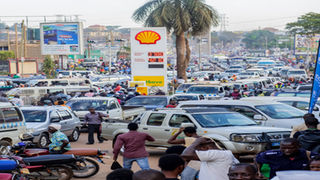
Kampala and Uganda at large has a disjointed transport system. PHOTO | file
|Politics failing improvement of transport systems - study
What you need to know:
- Inter-government disputes and limited support from the Presidency, according to a study by Friedrich-Ebert-Stiftung are failing the creation of a structured transport system.
Inter-government disputes, politics and the limited support from the Presidency is failing the establishment of a structured transport system, according to a study by Friedrich-Ebert-Stiftung.
The study titled: The political economy of public transport in greater Kampala notes that inter-ministerial disputes, particularly between ministries competing to host Greater Kampala Metropolitan Area Authority, KCCA and certain ministries such as Ministry of Works and Transport, is among the 15 ‘spoilers’ that threaten reform efforts in in Uganda’s urban transport system.
The study, which also notes that Kampala is ill-designed for the onslaught of rapid urbanisation, also highlights the lack of support from the Presidency in establishing projects such as Bus Rapid Transit, which is a core project under the National Development Plan, as a key challenge to improving public transport in Kampala.
“Limited support from the Presidency and Ministry of Finance is thought to be central to the stalling of plans for [Bus Rapid Transit] and a general failure to get large initiatives off the ground,” the study says, noting that uncoordinated planning and institutional silos are major spoilers of public transport improvement in Greater Kampala.
Such failures and disputes, the study notes, have made it almost impossible for the people leaving and working within Greater Kampala to get a reliable transport system, which makes working within Kampala a nightmare.
Kampala currently, according to the study, has a day time population of four million people, which reduces to 1.5 during the night.
The rapid growth in population has come with a number of challenges with congestion and traffic jams becoming a major concern for many people within the Greater Kampala Metropolitan Area.
However, the Ministry of Works and Transport Permanent Secretary Waiswa Bageya, dismissed findings of the study, noting that working in silos and inter-government disputes were now a thing of the past.
“Now, our planning and budgeting is following the integrated transport infrastructure services programme, which brings all players in the transport sector together. We are now more coordinated with more than 60 players,” he said, noting government was working on a transport master plan with the support of the European Union to get a proper guide in transport planning and development.
He also revealed that about a month ago, a paper had been presented to Cabinet to try and solve the issue of transport congestion in Kampala.
However, Mr Bageya did not give details on where the proposal of the paper had reached.
The study, which claims to be a humble attempt to pinpoint reasons for failure to improve urban mobility also noted that: “The many actors and interests involved have tended to reproduce problems of uncoordinated planning and institutional silos”, with people involved trying out many things that reproduce and exacerbate problems of coordination.
According to Kampala Capital City Authority, 50 per cent of workers in Kampala walk to and from the city centre everyday while 30 per cent use taxis, 10 per cent boda bodas and 10 per cent personal cars.
Frustrated
A number of proposals, among which include the metre-gauge railway, Bus Rapid Transit and cable cars, have been proposed as solutions to reduce congestion and traffic jams in Kampala.
However, these have largely remained on paper with some being resisted where: “In many cases, the people lobbying for these transport modes are not thinking much about the integration that will inevitably have to be central to any effective approach in Kampala.
The study notes because of this, there is a tendency to see other transport modes as direct competitors to those being fronted.
“Given that specific revenue flows tend to follow specific transport modes, the politics of this are very challenging,’ which therefore, because of poor coordination, blockages and lack of cooperation projects are never implemented. Actors within a given government department often do not feel that they can criticise other agencies and ministries, or people within their own ministry - even when it is clear what blockages or delays are being caused,” the study showed.




